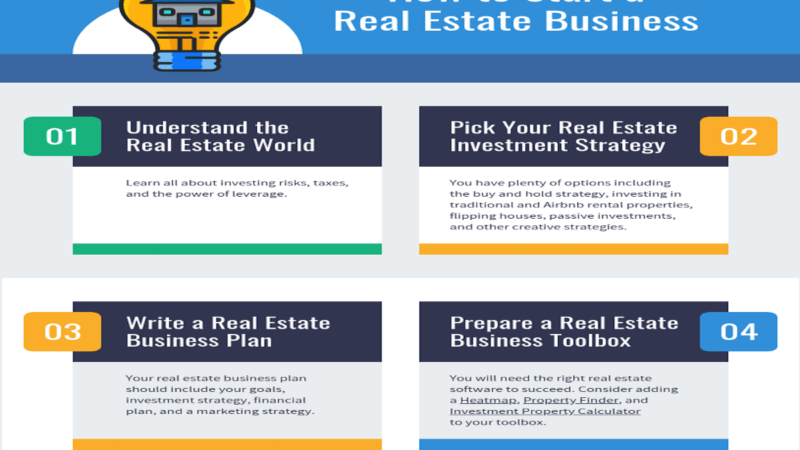Breaking into Real Estate: Demystifying Broker License Requirements
 Compellingly showcase your skills and experience. Your clients seek a real estate agent with extensive knowledge of the local market, can negotiate effectively, and has a solid reputation.
Compellingly showcase your skills and experience. Your clients seek a real estate agent with extensive knowledge of the local market, can negotiate effectively, and has a solid reputation.
Brokers also ensure that real estate transactions are lawful and that monies, such as earnest deposits, move into and out of escrow accounts correctly. They may also perform clerical duties, such as typing and filing. Contact Real Estate Broker Las Vegas now!
If you’re ready to start a new career as a real estate broker in New York, you first need to satisfy the state’s licensing requirements. This involves passing a state exam and satisfactorily completing 75 hours of pre-licensing education. You’ll also need to pass a background check and complete courses on cultural competency and implicit bias training.
Once you’ve completed your education and met the experience requirements, you can apply for a real estate license online through. You’ll need to provide a sponsoring broker who is an active, licensed real estate broker in good standing with the state. Then, you’ll need to schedule a time for the state real estate broker exam through the same system. On exam day, you’ll need a government-issued photo ID and a printout of the “Summary of Your Submission” page generated when you scheduled your exam.
To become a broker, you’ll need to have 3 years of “equivalent experience in general real estate business.” This can include a combination of closed residential sales, rental agreements, and mortgage transactions. New York uses a points system to evaluate your experience and determine whether you have the qualifications to become a broker. Each real estate function has a different point value, and you must earn at least 3,500 points to qualify for a broker license.
Once you have a broker license, you can start your own brokerage or work for an existing one. When choosing a brokerage to join, you’ll want to consider things like its reputation, both locally and nationally. In addition, you’ll want to find out if it offers the kinds of services that fit your needs. For example, some brokers prefer to work at large brokerages with national reach, while others may thrive in a smaller, local brokerage. If you choose to work for yourself, you can decide whether to form a sole proprietorship or corporation. If you form a corporation, you’ll need to file additional paperwork with the Department of State. This includes a certified corporate resolution, the incorporator’s signature and seal, and a copy of the corporation’s license to engage in real estate activities.
In order to operate as a real estate broker, you must obtain a license from the New York State Department of State. The license requires you to pay a fee, meet educational requirements, and pass an exam. You must also pass background checks, criminal history checks, and a drug test.
Real estate brokers supervise the activities of real estate salespeople and must ensure that all transactions meet federal and state guidelines. They are responsible for training their agents, providing support services such as back-office staff and marketing, ensuring that all the people working for them are properly licensed and trained, and assisting them in finding clients. In addition, they must provide a clear statement of compensation to their agents, which includes the percentage of commission they will receive on each sale.
To become a broker, you must complete the 120-hour prelicensure broker course and take the New York state broker exam. The exam is a multiple choice and you will be given two and a half hours to complete it. You can register for the exam through eAccessNY, which is the state’s licensing management system. Once you have completed the education and training requirements, you must submit a completed broker application along with your background information and financial qualifications. You must also provide the name and address of a sponsoring broker.
If you wish to work as a sole proprietorship, you must have at least five years of experience. If you are a corporation, limited liability company, or partnership, you must have at least three years of experience.
To satisfy the experience requirement, you must provide written statements from the brokers with whom you were licensed during the past three-year period. The letters must be notarized and signed by the sponsoring broker. Additionally, you must also demonstrate that you have completed the broker qualifying courses, which consist of 2.5 hours of ethics and 1 hour of recent legal matters.
Real estate broker licensing requirements vary by state, but most states require a licensed real estate agent to be employed by a brokerage and have their transactions overseen by a registered broker. This ensures that an agent is following federal and state laws and is held legally responsible for any issues that may arise during the transaction.
In New York, a real estate broker license is required for anyone who wants to sell or buy property in the state. You can find a broker’s contact information by searching for them on the eAccessNY website. Once you find your broker, you will need to send them a letter of introduction that includes your name, license number and agency information. This is important because it will allow the broker to verify your credentials and assign you an ID number.
The next step in becoming a real estate broker is to take the New York State licensing exam. The exam is a multiple choice test that is based on the 75-hour broker and 77-hour salesperson pre-licensing courses. The test takes two and a half hours to complete. You must score a minimum of 70% to pass the exam.
Once you have passed the licensing exam, you can begin working as a broker. It is also helpful to have a broker mentor as you start out in the business to help you understand all of the legal issues and responsibilities that come with being a broker.
Continuing education is another requirement for real estate brokers in New York. Brokers must attend a three-hour course every two years to refresh their knowledge and keep up with current real estate trends. Lastly, all real estate brokers must pass a criminal background check through IdentoGO before they can receive their license.
When your license expires, you will receive an email and a post card from the Department of State reminding you that it is time to renew. You can also renew your license online through eAccessNY. You will need to provide proof of your continuing education and submit a fingerprint-based criminal background check through IdentoGO.
If you think of real estate as a career ladder, with home buyers and sellers at the bottom and agents in the middle and brokers at the top, it’s easy to understand why a broker requires a license. They handle the higher level jobs that require a greater degree of knowledge and expertise, including marketing properties, writing up contracts and representing buyers or sellers. Brokers also have the ability to move money in and out of escrow accounts, mediate disputes between parties and hire other agents to work under them.
To become a licensed real estate agent, you need to complete a series of classes, take and pass licensing exams and meet certain fieldwork requirements. Many real estate companies pay for your training and cover the costs of your licensing exams, so it can be a very lucrative position. Licensed assistants are able to perform most of the same tasks as their licensed counterparts, but there are some specific activities that they cannot do, such as negotiate contracts, prepare offers and represent clients.
Licensed assistants can, however, assist with research and marketing. They can write all types of advertising materials, and they can help to obtain information from public records and the MLS system. For instance, a licensed assistant can help to put a listing in the MLS by taking photos and entering the property’s information. A licensed assistant can also help to place and remove signs on a property.
In a small brokerage, it may be possible for a licensed assistant to become an associate broker, although the law differs from state to state. These individuals typically have their own licenses, but they choose to work under a principal broker. Associate brokers are sometimes called broker associates, broker-salespersons or affiliate brokers. They must still complete the same coursework and pass the same exams to get their license, but they may have less liability in the event that they make a mistake.
A licensed assistant can also interpret documents and offer opinions, but this should only be done if you have permission from your broker to do so. You should be sure that your assistant is covered by E&O insurance (Errors and Omissions), as this type of coverage covers them in the event they misunderstand a legal document or provide incorrect information to a consumer.



